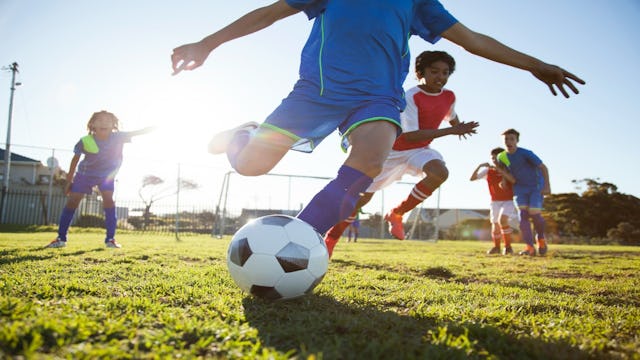No, Your Kid Probably Isn’t Going To Be A Pro Athlete

Since just about every aspect of professional sports is somehow translated into a statistic (think batting averages, quarterback completion rates, and triple doubles), I have two important statistics that every parent of a kid playing sports needs to hear.
First, the odds of your child playing sports in college on an athletic scholarship are slim, to say the least. Only about 2% of high school athletes will earn coveted scholarship assistance for playing sports in the NCAA.
Second, of those 2% who play sports at the collegiate level, the probability of them going on to play professional sports aren’t really any better. For baseball, it’s only 11%, for football it’s a mere 1.7%, and for basketball it’s only 1.2%.
In addition, youth sports as of late has morphed into something many of us don’t even recognize anymore. With the privatization of many leagues and the huge popularity of expensive travel teams, many families find themselves priced out of playing youth sports. And then there is the whole specialization/burnout/injury factor — or what happens when you force your three-year-old to play soccer (and only soccer!) until he/she either makes it to the MLS, or blows out their ACL five times.
So with odds like those, inequality issues, and the potential for serious burnout, why do three out of four American children continue to participate in youth sports? And more importantly, why should we, as parents, encourage them to play sports (if they’re interested, of course)?
Well, because the many physical, emotional, and mental health benefits children gain and receive from playing team sports considerably outweigh the the negatives. And when done right, even the burnout issue (for children who specialize in one sport, there is about 80% chance of them quitting by age 15) becomes a non-issue when children are allowed to play and compete in multiple sporting disciplines.
But what exactly do children gain from playing sports, and how do those gains transfer into adulthood?
1. Learning To Lose (Gracefully)
This may be the one thing about youth sports that transfers immediately into just about every aspect of adulthood — the fact you’re going to lose sometimes. And you’re going to epically fail. And fall on your butt. And not win when you really, really thought you were going to win. The sooner kids know that failing is the best path to eventually winning, the better.
2. Physical Activity Throughout Life
Childhood obesity rates are the highest they’ve ever been, with screen time and reduced recess/p.e. classes primarily to blame. But kids who play sports? Not only does it help increase their daily physical activity, but research suggests is continues into high school and adulthood. Girls who play sports in middle school are more physically active in the 12th grade than those who didn’t, and adolescents who play sports are eight times as likely to be active at age 24 than adolescents who do not play sports. And 3 out of 4 adults who play sports played them as a child.
3. Brain Power
Being physically active has been shown to improve academic achievement, including grades and standardized test scores. In the sports context, it also has effects on attitudes and academic behavior, enhanced concentration, attention, and improved classroom behavior. A survey of 400 female corporate executives found 94% played a sport and that 61% say sports contributed to their career success.
4. Happiness Factor
Perhaps the most important (seeing as how depression and anxiety rates among teens are skyrocketing), is the fact that teens who play sports have higher self esteem, more confidence, are less likely to do drugs, less likely to be sexually active, and less likely to suffer from depression.
5. Character, Discipline, And Commitment
We all know how hard it is to get up everyday and go to work, take care of our families, and make a difference in our communities. All the personality characteristics it takes to do those things can be learned through youth sports. Being on a team with a shared goal, persevering through tough work days, and not walking out on your responsibilities are all things you learn in sports that are easily transferable to adulthood, and can help you live more balanced and positive life.
Experts say to gain the most benefits from youth sports, having your child specialize in one sport all year is not the way to go. Instead, it’s a better idea to play what’s in season, giving your body and mind a chance to flex its muscles so to speak, and learn different sporting strategies, ways of thinking, and reduce strain on the same set of body muscles.
Don’t worry if they will never be great at one thing. It’s better to be good at a lot of things, than be perfect at one single thing. Funny, but isn’t life like that, too?